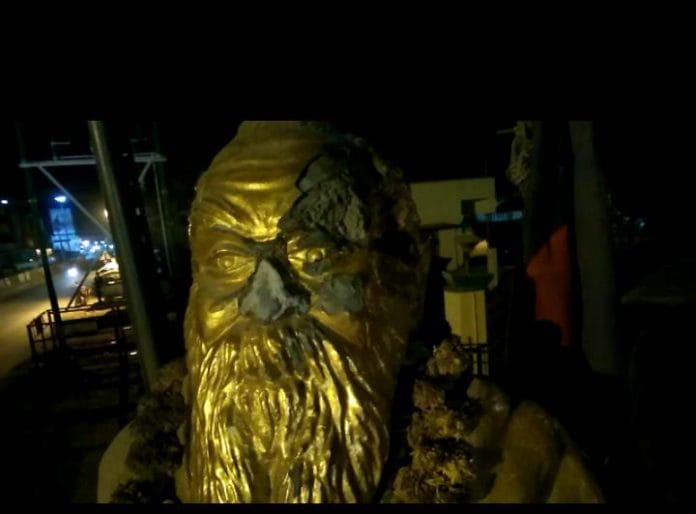The media portrays the politics of Periyar and B. R. Ambedkar as one of their communities and not human liberation, denying it any universal potential.
After the statue of E.V. Ramasamy, better known as Periyar, was vandalised on 6 March in Vellore, the media has begun reintroducing him to the Indian public. In one such instance, an opinion piece in the Indian Express summarises Periyar’s legacy thus: “He [Periyar] stands for a politics that foregrounded social equality, self-respect, and linguistic pride. As a social reformer, he focused on social, cultural and gender inequalities, and his reform agenda questioned matters of faith, gender and tradition. He asked people to be rational in their life choices. He argued that women needed to be independent, not mere child-bearers, and insisted that they be allowed a equal share in employment.”
But the article strangely concludes with this paragraph saying, “Periyar is seen as an icon of OBC political assertion. Any attempt to deride him will be seen as an attempt to undermine the gains made by OBCs even beyond Tamil Nadu.”
The reference to OBC politics here seems out of place because one, Periyar did not articulate his politics as limited only to peasant artisanal castes; and two, his legacy – as the author points out – is much broader in scope.
The administrative category called Other Backward Classes did not exist as a political idiom during Periyar’s time. It became a socio-politically viable category only after the Mandal Commission report was partially implemented by the V.P. Singh government in 1990. Also, even though the term is most associated with peasant and artisanal castes, nomadic tribes as well as Muslim and Christian Dalits are also included in OBCs.
To call Periyar an icon of OBC political assertion is to limit his life’s work and deny the broader anti-caste movement to appropriate his legacy.
How do we define OBC politics? The most plausible answer would be to list out issues that immediately concern the community such as reservations, caste census, inclusion/exclusion of castes in the OBC list, etc. This kind of politics is always couched in welfarist terms and demands concessions within the system instead of demanding radical restructuring of the system itself. This politics also stresses the upliftment of the community to some idealised higher standard instead of looking at individuals as already-existing full citizens entitled to rights and dignity.
It would be a disservice to make Periyar an icon of such kind of welfarist politics because his life work revolved around challenging Brahminical hegemony and calling for an end to all kinds of oppression. He also was a lifelong advocate for reason, rationality and science, and imagined a society based on these principles.
Just two years before his death in 1973, Periyar had said, “Though I have endeavoured all along to abolish caste, as far as this country is concerned, this has meant I carry out propaganda for the abolition of god, religion, the shastras and brahmins. For, caste will disappear only when these four disappear. Even if one of these were to remain, caste will not be abolished in its entirety…because caste has been constructed out of these four… only after man has become a slave and a fool would caste have thus been imposed on society.”
Would you say these thoughts lend themselves to an OBC politics or a politics that desires a complete annihilation of castes? Dr B.R. Ambedkar similarly gets branded as a Dalit icon. Columnists reduce him to a figure that is relevant only to Dalit politics, whatever contours and scope of such a politics may be.
For example, it is easy to read Ambedkar’s Mahad Satyagraha, as a struggle for establishing the right of Dalits over a public good. But this would be a narrow reading of this historic event. The struggle was also about equality, citizenship and dignity of life, and by making a claim over something as basic as water, Ambedkar implicated the whole society in keeping the caste system alive and actively oppressing Dalits. Ambedkar, through his life’s, work strove for a society based on principles of equality, freedom, liberty and dignity of life. Even though Dalits were the primary constituents of his politics, he wanted nothing less than a complete transformation of society.
Ambedkar and Periyar were two great political figures of the 20th century. Their caste backgrounds surely informed the radicality of their politics. It is hard, nay impossible, for the Brahmin class to produce such a leader from among them. But it is one thing to highlight the importance of the ‘experiential’ and another to box that experientiality into ‘particular’, denying its universalising potential.
It is strange that anti-caste movement often gets labelled as identitarian, but at the same time the tallest leaders of the movement do not escape their ascribed identity. Their politics is supposed to be the politics only of their community and not human liberation, denying it any universal potential.
Tejas Harad is a social commentator and works at the Economic and Political Weekly as copy editor.






